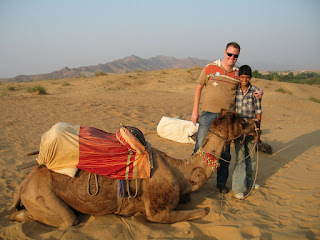It's Christmas eve, and we're driving from Jaipur (Rajastan) to Varanasi (Uttar Pradesh). There is absolutely nothing that feels remotely like christmas here. It's a beautiful place, but it's beauty is not aesthetic. At first glance, India seems a dirty, run down, third world country. But there is something inherently fascinating about the way the society hangs together, despite the constant flow of baksheesh (which means bribe or tip depending on the context), the slow crawl of traffic, and the incredible poverty of a large proportion of people.
My first impression of Dehli was a short one, but the hotel that arrived at was reasonably well appointed, and directly across the road was a small slum. Among the rubble a family sat next to a ramshackle tent and cooked their morning meal. Across the road, backpackers lived in relative luxury, enjoying warm showers and western style breakfasts.
Straight off the plane from Moscow, I met Adam and Kelly and we embarked on our journey across the north of India. First stop, Pushkar. The city is famous for it's holy lake. A place of worship and daily ritual for the predominantly Hindu population. As the signs clearly state, alchohol and meat are banned within the city limits. However it is becoming apparent that there are many ways to bend the law in India, and some of these included ordering the "special" coke, that was available on the menu at our first restaurant. In the hotel things were more clear cut. Upon asking at reception we were told that we could order beer an inflated price (about 200Rs). We were told that the beer would be delivered to the room, little did we know that the beer would indeed arrive at our room, but some time later, and stuffed down the pants of one of the bell boys so that no-one could see him bringing it. Apart from being incredibly amusing to watch a rather small Hindu man trying to walk around with three 700mL bottles of beer stuffed down his pants, it was interesting to see the contrast that exists in india; First, how seriously they take particular laws, and yet how willing some people are to break them for the right price.
The other interesting story to arise from Pushkar was the recent events which had led to the lake being bone dry. With the climate change zeitgeist looming in my mind, my heart immediately went out to the poor peoples of Pushkar, another traditional lifestyle falling victim to slow march of drought. You could imagine my surprise to find out later, that the lake had actually been drained on purpose after being poisoned under tragicly ironic circumstances. Although I heard several versions of the story, the one I like best came from our Camel driver, Lala (pictured right), who painted a vivid picture as the sun set over the desert behind us. Lala described the scene on the day of the festival of just prior to the wet season, in which all the Hindu's in the town bring floating Ganesh statues down to the water and set them adrift in order to give thanks for the life giving rains. Unfortunately, this year, unbeknownst to the thanksgiver, his giant Ganesh statue was actually constructed from poisonous materials, which, upon sinking into the river, released a toxin into the water powerful enough to kill all the fish overnight. The next morning, the exclusively vegaterian town of Pushkar awoke to the rancid smell of rotting fish. The markets were closed for weeks, and the clean up operation began. Conspiracy theories flourished, involving a deal between the cleanup company and the government for a contract that was made in prior to the poisoned Ganesha being delivered. However, in time the lake should fill back up, and these events will fade into the quickly forgotten Indian past, but for now I'm happy to fill the gap in my experience with the postcard photos version displayed proudly in every hotel and shop stall, showing thousands of brightly coloured sari clad women hunched on the Ghats beside a sprawling lake, ringed by the haphazard white town of Pushkar.


No comments:
Post a Comment